#shrine of the holy family
Explore tagged Tumblr posts
Text
| 𝒮𝑒𝓁𝒻𝒾𝓈𝒽 𝐿𝑜𝓋𝑒 | Chapter Two

Mafia!Ot8!Ateez x female!reader
Summary: After losing everything through gambling, your father's debts to the Ateez Mafia have resulted in you becoming their property. With no other family left, you are now at the mercy of these dangerous criminals due to your father's reckless actions.
Warnings: mxm relationship, death, murder, mentions of being burned at the stake, tragic backstory, violence.
WC: 2k
Amazing Help: @potatomountain
AU: Mafia/?
Nets: @othersideoutlawsnetwork
Tags: Tags: @xomakara @jedi-dreea @beabatiny @ateezaddict24 @spenceatiny18 @18fernanda @prodsh00ky @evercodeee @yizhou-time @smally97 @eshia-16 @daniela-f-uwu @peachyy-joonie @butterfliesinthenightsky @dassmyname @unlikelysublimekryptonite @dollinno @stay-tiny-things @joongscheese @misskarynie @monstacheol @yeosangcutie0615 @mariaa @pinuspot @amphiroxx @kitten4sannie tags to be continued.
A/N: This series isn’t what you thought it’d be huh? Hehehe
Taglist Link

500 years ago, Kim Hongjoong stumbled upon a dirty and old shrine. Bruised, bloody, and broken.
He begged the silent deity for help, tears cascading down his nearly broken jaw. A miracle he could still talk. His broken fingers dropped all of the coins he had to offer onto the shrine. He continued to beg for help and prayed to the God but he got no answer.
His body could no longer sustain his energy and he collapsed onto the wet ground. Hongjoong knew this was the end and he didn’t want to die like this.
Hongjoong let out one more scream before the light faded and he passed out from his injuries. No longer able to stay present.
To die for loving the wrong person. He would never change it, even if this was his death.
The deity appeared out of thin air and stared down at the almost corpse on his sacred ground. He couldn’t help but shake his head.
“Humans and their violence. Wake up, boy. I will not have you die on my holy shrine.” The deity pressed two fingers to Hongjoong’s head and he awoke with a gasp for air.
“You..Thank you.” Hongjoong tried to sit up but his ribs and other miscellaneous injuries screamed at him to stop. How he is still alive is baffling. The deity thought of him as a fighter for surviving this long with the extent of his injuries.
“Why have you come to my shrine, why do you seek my help, human?”
“Because I don’t want to die. I need to live for Seonghwa, but his family won’t let me see him anymore. They’re the reason I’m like this. They tried to kill me but I got away.” Hongjoong was able to sit up with the help of the deity, who only frowned at his words.
“Love? That’s a strong reason to fight for your life.” He admired that. A lot. He missed his love life.
“Do you want revenge, human?”
“What? I- I..yes. I do. I shouldn’t be tortured or killed for loving another man.” Hongjoong truly loves Park Seonghwa of the noble Park family. He hated Seonghwa’s face and screams when he was getting the shit beaten from him.
Hongjoong hated the Park family for trying to kill him in front of his lover. He wanted them dead. He wanted to steal away Hwa and live in the mountains away from the rest of this cruel humanity.
“Very well. I can feel your anger, human. I will grant you your revenge but it comes at a cost.” The deity crossed his arms before speaking once again, “You must take my powers and my status. You will be a God instead. Only then I’ll finally be free of this torture of living forever.”
Hongjoong was confused, “Wait, you’re willing just to give up everything? For me?”
“Believe it or not, I was once in love just like you. I was born a God, they were born a human. It was agony watching them die and I’m ready to be with them. But you must take it from me.” The deity held out his hand, a glow emitting from it. It was so inviting.
Hongjoong furrowed his eyebrows before quickly grasping the deity's hand. A scream emitted from their longs as the power was transferred to Hongjoong.
Nothing else was said as the deity faded into nothing but dust.
Hongjoong could feel the power coursing within him. Each wound and broken bone was immediately healed and he felt a strange sense of longing. He knew it was for his lover down in the village. He could only hope he was still alive and not locked up in a cell by his family. Or worse, being forced to marry someone very fast.
Hongjoong didn’t care. He was going to kill them alone and take Seonghwa away with him.
One quick flash and he was standing in front of the Park residence. The guards screamed at him and ran towards him to finish the job they tried to do earlier. They failed and were flung to opposite sides. Hongjoong made them disappear as if they never existed and marched his way in, blasting the doors open with just an open palm.
Screams were heard from inside. Good. They should be scared.
“You! How are you still alive!” It was Seonghwa’s father. No matter, he was swiped against a wall with a flick of a wrist.
“Peasant.” Hongjoong spat at the man’s now broken body.
Seonghwa’s mother screamed in absolute horror, “Geo-“ Dead. Hongjoong broke her spine with yet another gesture.
Seonghwa’s older brother ran out to be by his dead parents and to fight Hongjoong. It was pointless. Hongjoong killed him too. Nothing was going to stop him from finding his lover.
“Seonghwa?” Hongjoong called out as he stepped over multiple corpses. He ripped his bloodied hanbok and threw the pieces to the ground, they were pointless.
He couldn’t find Seonghwa anywhere. Fuck. They must’ve locked him up. That angered him much further. Hongjoong left the residence ablaze once he stepped out of the threshold. Villagers who saw the massacre stayed out of Hongjoong’s way. Now terrified of the man.
A good choice.
The new deity made his way to the village's cells. Once he gets his man, this whole town will be gone. He wasn’t going to leave anyone alive. Not after they all sat around and let Hongjoong and Seonghwa be separated.
With the cells in site, the guards were slaughtered and he burst open the gates, each criminal ran out of their cells in fear but Seonghwa remained. He knew his lover came back for him. He didn’t care how.
Seonghwa was just happy Hongjoong was alive.
“Hongjoong!” The noble ran out of his cell and into Hongjoong’s arms, “How are you alive?”
His lover only laughed, “I’ll tell you later, for now we must leave this place. We don’t belong here.” Hongjoong kissed Seonghwa with such fever that he refused to separate for several moments.
They left the village hand in hand. Hongjoong didn’t even bother to look back when he set everything ablaze, leaving nothing to save itself. He got his revenge and much more. Nothing was going to separate them ever again. Ever.
-
Kim Hongjoong and Park Seonghwa, both now immortals, faced the earth and its challenges together. They hid in the mountains away from the humans to maintain their happiness and peace. Hongjoong had gave Seonghwa powers to protect himself. Powers that matched their invisible tie to each other. He honed abilities from the planet. Elemental.
Seonghwa maintained a garden that he took care of with his new powers. The animals in the forest kept him company when Hongjoong had to leave to Deity Overworld, now that he’s a god.
One day, Seonghwa heard a blood curdling scream and chanting coming down the mountain. Hongjoong was gone so that couldn’t be him.
Seonghwa set down the white rabbit in his lap and marched down the hill, carefully treading.
Once he made it past the clearing, he found a big man strung up to a post, men and women surrounding it with torches. Seonghwa knew what it was immediately. A witch trial.
Humans are so cruel to anything different.
Just as they were about to light him aflame, Seonghwa cleared his throat, “I suggest you let him down or there will be consequences. I don’t take innocent bloodshed lightly.”
The people whipped their heads toward the newfound voice, “Excuse me? How dare you threaten us. Are you a witch too?” A man poked Seonghwa’s chest with a pitchfork.
He didn’t like that. Without moving, the ground swallows the man whole, “Anyone want to go next?”
The humans screamed in fear and ran away, not wanting to die.
The man on the post had been crying, thankful to be saved. Why did he have to be scorned for practicing a non harmful craft?
“It’s okay, I’ve got you now.” Seonghwa cut the ropes that held the man high, “Careful.” He caught him as he fell, “What’s your name? I’m Seonghwa.” A beautiful smile stretched his cheeks as he kept the man warm.
“Yunho. Jeong Yunho. Thank you for saving me. I’m forever in your debt.” Yunho’s large hands grasped Seonghwa’s in desperation, “I don’t know how to even begin to thank you.”
Seonghwa shook his head, “You don’t need to. What the humans are doing is harmful. You don’t deserve to die, Yunho. Come with me. I’ve got somewhere to keep you safe.”
-
“Um, Seonghwa, who is this?” Hongjoong appeared from a mist into the living room, confusion smeared on his features.
Yunho jumped, nearly screaming in his spot, still jumpy from earlier.
“Hey, it’s okay.” Seonghwa was quick to comfort the big man, “This is Yunho, he was about to be burned at the stake for witchcraft..I just couldn’t let that happen.”
Hongjoong melted at his words. One of the many reasons he fell for Seonghwa. His selflessness and care for others beside himself.
“I see, well, make sure he has somewhere to stay warm and rest. I’m sure it was stressful.” Hongjoong smiled and walked to his bedroom, exhausted from traveling between worlds.
Yunho smiled to himself and held the blanket close to his body, “You two are very kind. Thank you for the hospitality.”
“So, tell me, Yunho. Do you have anyone?” Seonghwa carefully sat beside Yunho, caution on his features.
“Ah, no. I don’t. It’s just me. I suppose that’s why it was so easy for me to be found by those villagers.” He could never return to his home. Not if he wanted to live.
“Well, I have a proposition for you then, Mr. Yunho, how would you like to live forever without having to worry about being burned alive?” Seonghwa offered with such nonchalance.
Yunho was in shock. What was he saying?
“Huh?”
“Look, Hongjoong and I are immortal. Hongjoong is a god and he gave me immortality to be with him forever. I want to give you that now. I know you could use it for the good in your heart.” The former noble was serious in every sense, “Of course, I’d have to talk to Hongjoong but I want to give you that offer.”
“I just thought you were also a witch honestly.” Yunho laughed.
“Well, no, but still.” Seonghwa stood back up, “I’ll let you think about it but I’m going to go speak to Hongjoong about this.”
-
“You’re an immortal now, how do you feel, Yunho?” Seonghwa grinned, Hongjoong’s arm around his waist.
The new immortal couldn’t help but cry as fire emitted from his palms, “I..I’m so happy.” Of course the fire was a bonus. Now he could make everyone pay that tried to burn him alive.
“Be careful with that ability, Yunho, I know what you’re thinking. I can hear everything. If you do not tread my warnings carefully, I can take it all from you without breaking a sweat. So don’t test me.” Hongjoong was stern but he knew Yunho wouldn’t break his trust. It was like he had a golden retriever that followed his every demand and order.
After all, this was just the beginning of a big tale to come.
“I will, thank you, Hongjoong.”
The three men would continue to live in harmony for decades. In peace and tranquillity. They never had to worry about another human trying to kill them and Hongjoong helped Yunho and Seonghwa hone their abilities. He was going to shape them into beasts. A small army if you will.
Nothing was going to stop him from being who he was meant to be.
They lived their lives on a pirate ship that sailed the ocean, that Hongjoong had stolen, becoming the new feared pirate crew for years to come.
He had to grow this team and he had to use the abilities he was given.
Yunho made them a fourth member. A living doll but with a human body. His name is Kang Yeosang and he’s another immortal. His abilities are unknown as he’s still getting accustomed to being a living doll. Made from dark magic.
Again, this was only the beginning for this forming team.
They’re only going to get stronger.
#ateez x reader#ateez smut#x reader#hongjoong smut#san x reader#yunho x reader#jongho x reader#hongjoong x reader#seonghwa x reader#mingi x reader#selfish love ateez
278 notes
·
View notes
Text
tbh, I feel like I’ve been drifting away from the original scummy scara I made when I first made the au, so I would like to let everyone know that he is a BIG freak. the type of guy you avoid because he’s just… so creepy and weird. like, restraining order, banned in fifty states type of weird.
he will steal a pen you’ve been nibbling on in class, and do all sorts of things to it that you don’t wanna know. like shoving it down his throat or something idk.
he goes through the trash and takes the gum you spat out, and chews it as if he were a man on death row. and at this point he might as well be.
he ‘makes’ you home made lunch. (which is just store brought food he put into a lunch box). awe, so thoughtful, right? NO, he passed out after cumming so much to replace the dressing on your salad.
spits in your drink, so it’s almost like you’re kissing in a way, because his saliva is in your mouth yada yada. he’s so delusional, gosh.
this man jerks off to anything. pictures of you in a bikini. pictures of your panties that he snuck a photo of from under your skirt. hell, he has even fapped it to a post he found on one of your family members facebook where you look like the most ordinary person ever. anything.
he acts like an angel around you, but the moment you turn your back, he has this dark, violent glint in his eyes at anyone who isn’t you.
he STANK. like discord moderator who manages thirty different servers. he plays video games 24/7 and eats only fast food + he lives in his mothers basement so minus points.
his mind is SO dirty too. like you could be complaining about this one girl who has been getting on your nerves recently, and all he can think about is bending you over the table and running his hands all over your body. he thinks of you when he shouldn’t, and in ways he shouldn’t, even before you knew his name.
yeah he’s so sweet, and kisses the ground you walk on. but he also would love nothing more then to knock you up and keep you as his cute little spouse who he can come home and make love to every day.
god and he’s a brat too, don’t get me started. like, throwing tantrums when you decide to sit with someone else at lunch. starting fights with people who so much as look in your general direction (ones that he loses cause he is so small and scrawny). screaming profanities at the professors who separate your seating plans in lectures, and so on.
if you’ve been keeping up with my posts, you’ll know that this man has a literal sex doll replica of you he sleeps with at night. it’s so detailed to the point where there is freckles in the exact same spot they are on your skin. (even some moles and beauty marks that you didn’t even know you had, and god knows how he does).
has a shrine of you in his closet. strands of your hair he has collected. lipgloss and chapstick he has stolen from your bag whilst you weren’t looking. accessories like rings and bracelets. nail polish, all the works. and in the middle of this shrine, in all its glory, is a pair of your underwear that he took while you were in the changing rooms. he prays to it. the holy grail.
he has been dating you in his head the moment he saw you, like, gets a little annoyed when you don’t remember your five month anniversary, but the thing is, you didn’t even know you’re dating at all.
I love him. don’t get me wrong, but he is not the man you want to get involved with, like AT ALL.
go for someone like scummy alhaitham, who has (some) self respect 👍
617 notes
·
View notes
Text
Things that Happen in my Mystreet Rewrite that just make sense…✨
First of all, Laurance did not discover where Aphmau lived and decided they should move in across the street (bc holy shit that’s creepy). They had already lived across the street and told Aphmau, Katelyn, and Nana about the listing. They agreed bc it was closer to wear they all worked.
Nana DOES NOT HAVE A SHIPPING SHRINE.
Aphmau works as an editor at a publishing company, Katelyn is a teaching assistant going back to college, and Nana is a waitress/baker at a popular bistro in the city.
Garroth and Laurance are very much still in love with her but Aphmau really just doesn’t notice.
Aphmau is an aspiring author writing a fantasy novel. She will get anyone and everyone to look over chapters and read them (Nana is a current victim of this)
Speaking of Nana I’d like to start her backstory early. We’d meet some of her siblings and we’ll see her ignoring calls from her parents. The secret is that the Ashida’s are a crazy rich family and Nana wanted to make a name for herself without the Ashida name. So much so that she started going by K.C. instead of the matriarch grandmother’s name she shares with her.
Nana is a chronic overworker, she’s so sweet but she does not know how to take a break.
Katelyn is the pseudo mother to her 3 brothers (Kacey, Kaden, and Kenneth.) She will call them to make sure they are alright as well as her father, who assures her that she can live her life without worrying about them so much.
Since there are a LOT of love potion hijinks in the series, the neighborhood play they put on will be A Midsummer Night’s Dream.
In that arc, the relationships of Garroth, Laurance, and Aphmau will be explored, but also the drama of Nicole, Dante, and Nana.
Zane is more of a businessman with the whole suit and everything. He can talk great business but never make him form actual connections with people bc he has no clue how to do that.
Aphmau and him do still become very good friends and they stay like that for the rest of the series.
Travis is just some very awkward guy who makes up for it with a lot of confidence. If someone flirts back he starts to silently panic.
Most of the relationships like Garlaurmau/Zana/Travlyn will be slow burns in their own way. At the end of the first “season” Aphmau will open up to the idea of dating them both.
Man I didn’t realize how much I rewrote until I typed this out lol
#I would love to tell people about Love~Love paradise to but this is already long enough#aphblr#aphverse#mcd#mystreet rewrite#aphmau#mystreet aphmau#mystreet nana#katelyn the firefist#garroth ro'meave
68 notes
·
View notes
Note
Hello, I really don’t want to be rude or anything like that but I would love to know any more information about the Christians in Palestine, Lebanon and Syria like, is it true Gaza had family lineages dating back to Jesus Christ? Asking because Ziocucks love making it seem as if Christians don’t exist over there
omg not rude at all, actually this is my favorite thing to talk about (it was a major focus of this blog prior to Al-Aqsa Flood) it's a huge topic so I'll link a ton of resources, but to answer your main question: yes, many Palestinian Christians in Gaza and elsewhere can trace their family history with Christianity back to the 1st century. the Christian community in Gaza is said to have been founded by the apostle Philip. the first bishop of Gaza was the apostle Philemon, the recipient of a Pauline epistle. a core zionist myth is the idea that contemporary Palestinians only arrived in Palestine in the 7th century or even the 20th century (see the links for debunking). but there's plenty of documentation of continuous Christian (and Jewish) presence in Palestine before, during, and after the emergence of Islam. Palestinians (and Levantine ppl more generally, but esp Palestinians because of the totality of their colonial dispossession—stories are often literally the only heirlooms refugee families have) typically have very strong family oral histories going back many centuries, so if a Palestinian tells you their family has been Christian since the time of Christ, take their word for it. community continuity is also about more than family trees—even if someone's family came to Christianity later, they're still part of the continuous living heritage of their community. the continuity of Palestinian Christianity is also evidenced by Palestinian holy sites. because Christianity was illegal in the Roman Empire until Constantine took power, dedicated churches weren't built until the 4th century, but many of these churches were built around existing sites of covert worship—for example the Church of the Nativity in Bethlehem was built around a grotto that was already venerated as the site of Jesus' birth, the Church of St. John the Baptist in 'Ayn Karim (a forcibly depopulated suburb of Jerusalem) was built over a 1st century rock-cut shrine marking the site of John the Baptist's birth, and the Church of the Multiplication in Al-Tabigha (a destroyed and forcibly depopulated village on the shore of Lake Tiberias) was built over a limestone slab believed to be the table were Jesus fed the multitude. throughout the Levant there are also many ancient shrines (maqamat) that are shared sites of prayer for both Christians and Muslims; in Palestine many of these sites have been seized by the occupation and Palestinians are prevented from visiting them.
Palestinian Christian communities who are able to travel to the villages they were expelled from in the Nakba will sometimes return there to celebrate weddings and holidays in their ancestral churches, e.g. in Iqrit and Ma'alul (x, x). of course because the occupation heavily restricts Palestinian movement this isn't possible for most refugees.
here's some resources to get you started but feel free to hmu again if you have any more specific questions! Zionism and Palestinian Christians Rafiq Khoury, "The Effects of Christian Zionism on Palestinian Christians," in Challenging Christian Zionism (2005) Mitri Raheb, I am a Palestinian Christian (1995) Mitri Raheb, Faith in the Face of Empire: The Bible Through Palestinian Eyes (2014)
Christ at the Checkpoint: Theology in the Service of Justice and Peace (2012) Faith and the Intifada: Palestinian Christian Voices (1992) The Forgotten Faithful: A Window into the Life and Witness of Christians in the Holy Land (2007) Faith Under Occupation: The Plight of Indigenous Christians in the Holy Land (2012) Palestinian Christians: The Forcible Displacement and Dispossession Continues (2023) Donald E. Wagner, Dying in the Land of Promise: Palestine and Palestinian Christianity from Pentecost to 2000 (2003)—can't find it online but worth checking your library for
Pre-Zionist History James Grehan, Twilight of the Saints: Everyday Religion in Ottoman Syria and Palestine (2016) Ussama Makdisi, Artillery of Heaven: American Missionaries and the Failed Conversion of the Middle East (2008) Kenneth Cragg, The Arab Christian: A History in the Middle East (1992) Christopher MacEvitt, The Crusades and the Christian World of the East: Rough Tolerance (2007) John Binns, Ascetics and Ambassadors of Christ: The Monasteries of Palestine 314-631 (1996) Derwas Chitty, The Desert a City: an Introduction to the Study of Egyptian and Palestinian Monasticism Under the Christian Empire (1966) Aziz Suryal Atiya, A History of Eastern Christianity (1968) Michael Philip Penn, When Christians First Met Muslims: A Sourcebook of the Earliest Syriac Writings on Islam (2015) Early Christian Texts The Acts of the Apostles (1st century, Palestine. yes I'm recommending the bible lol but I promise I'm not trying to evangelize, it just really paints a good picture of the birth of Christianity in Jerusalem and its early spread) The Didache (1st or 2nd century, Palestine or Syria—the earliest known catechism, outlining how Christians were supposed to live and worship) Cyril of Scythopolis, The Lives of the Monks of Palestine (6th century) Sayings of the Desert Fathers and Desert Mothers (early Christian monastics)
for more resources specific to my tradition, the Maronite Church, see this post. for other misc Syriac tidbits see my Syriac tag. this is just scratching the surface so again, if you (or anyone else who sees this post!) have more specific interests lmk and I can point you in the right direction
134 notes
·
View notes
Text
Family shrines were tenderly maintained within homes. The focal points of everyday spiritual life were these hallowed alcoves, which were embellished with statues, amulets, and pictures.
Offerings of bread, fruits, fragrant flowers, and refreshing water were straightforward but sincere, capturing the essence of respect and thankfulness.
These regular sacrifices were actions that cultivated and preserved connections. By providing for the gods, people showed gratitude for life's bounties as well as a request for their blessings.
It was a dance of energy, a mutual feeding where the roles of gods and mortals were interwoven.
We witness the core of Kemetic spirituality in these commonplace devotions—a smooth blending of the holy and the profane.
Every action, no matter how small, contained a hint of the divine;
life was not divided into the spiritual and the mundane.
Source
27 notes
·
View notes
Text
*bursts through the door, sweating and shaking* y'all Goodnight Moon on youtube uploaded her third sapphic vampire video and it gave me All The Vampy Romance Feels
Yuji is a tired 20yo who used to be a star athlete but around high school he lost interest, and then his grandfather died, and he had to drop out and work to support himself
he moves to Tokyo and starts working nights at this club, The Shrine, that only caters to a very select portion of the wealthy of Japan. he's just a busboy at first, but then one day the bouncer just doesn't show up for work, and some asshole clearly on drugs tries to start shit with the bartender, and Yuji likes his coworkers thank you very much so he just beats the shit out of the guy and throws him out
Yuji does not think anything of this until the next night, when he's called in by the owner of the club: Ryomen Sukuna, who just wants to have a chat as to how the hell he did that.
he's thrown because Sukuna looks like a meaner, more buff version of his dad, but surely that's a coincidence. His boss and his father aren't related, surely.
(they are. Sukuna did not devour his twin in utero in this world; instead, after becoming a vampire, he took to guarding his twin's line, and Yuji is the last of their family. Sukuna is. hmm. conflicted.)
('cause see, on the one hand, this boy is the last drop of his own brother's line. on the other, he's a disrespectful little brat with no fear, who just the previous night defeated an elder vampire in a fistfight. that shouldn't be possible, and yet it happened.)
Yuji is very confused when his boss, who clearly hates him, decides to promote him to the security team. but hey, bigger paycheck!
After a while of this, he runs into Megumi, who mistakes him for a vampire and tries to kill him; but then when Yuji is totally unaffected by silver, salt, or holy objects, Megumi is embarrassed and decides he must be a thrall, instead. Because what normal person would willingly work at Tokyo's premier vampire hotspot??
Megumi tells Satoru, one of the very few hunters who is also a vampire--he was born that way, instead of being turned later in life. Satoru is intrigued, and hits up The Shrine to see the kid in action.
some form of meetcute ensues, probably during which someone gets punched and Satoru goes "oh he's like, strong and adorable and hot. oh, I'm not surviving this with my dignity intact."
Yuji of course is an oblivious sweetie and doesn't realize Satoru is flirting with him.
Sukuna hates Satoru already but now he's caught between "We need to keep this uneasy alliance between vampires and hunters, lest we all become too weak and the werewolves kill us all" and "THAT'S MY BABY NEPHEW YOU CAD"
Yuji doesn't believe in vampires or magic and just thinks everyone is really committed to a bit that hasn't been funny in like six years.
The special grade sorcerers (Yuki, Satoru, Suguru, Yuta) are vampires who hunt supernatural troublemakers along with normal humans, werefolk, kitsune, and even a few oni; Rika-chan is Yuta's first and only thrall and he still feels really bad about that, but she's having fun and being herself as she gleefully hunts monsters for her beloved <3 Yuji ends up with one foot in the vampire underworld and one foot in the world of the hunters, and he can't go fully to either side because he's just a regular dude who fights good.
(not that Satoru and Sukuna ever stop trying to sneakily kill each other so they can "protect" Yuji. it's how they flirt.)
((although I do think this kind of story would be funniest if Sukuna eventually agrees to let Satoru court his nephew WITH YUJI IN THE ROOM and this 20yo modern dude is mortified by these centuries-old vampires talking about his dowry. it's 2021, my dudes!!!! nobody has a fucking dowry anymore!!!!!!))
#Jujutsu Kaisen#GoYuu#I just want Yuji to be a Normal Fella stuck with an uncle from the Heian era and a boyfriend who was born four hundred years ago#he tries to introduce them to the concept of ''marrying for love'' and they just stare at him blankly for a minute#before going back to discussing how to find a good nakodo
29 notes
·
View notes
Text
C'Thia, Surakian Philosophy, and Vulcan Polytheism

While most would consider Surak to merely be a philosopher and reformer, thereby removing any hint of religion from the discussion and forming instead an idea of both Surak and his philosophy as being, at best, atheistic or agnostic, and at worst, being anti-theistic, I have to strongly disagree with this assessment. Especially when it's used as proof to claim that modern, post-Awakening Vulcans are also at best atheistic or agnostic, and at worst anti-theistic. I believe this comes about due to a commonly held misconception that religion in and of itself is anathema to science, to progress, to intelligence, and therefore, to logic itself. This is, of course, a blatantly false binary and we are shown over and over again in canon that while Vulcans place a great importance on science, education, intellect, and logic, they are also a very spiritual people. Most of the important locations on Vulcan that we see in canon tend to be temples, sacred mountains, or holy ruins. Leaders tend to be high priestesses. Meditation is almost universal for Vulcans, and while it can be argued that it is very much a mental discipline as well, meditation was birthed, and continues to find its roots, in spirituality, and at its heart, is a spiritual discipline. Meditation, after all, was not invented by scientists, but by monks.

In the episode of the Animated Series, "Yesteryear", Spock tells Sarek that he is merely passing through ShiKahr on his way to the family shrine to "honor our gods". This one line proves to me that, at least for Spock, there is no incongruence between his modern Surakian belief and practice of C'thia (commonly this is translated as just "logic" but a more accurate Vulcan translation is "reality-truth") with that of traditional Vulcan polytheistic religious practice. One can assume that this is not, however, unique only to Spock, seeing as shrines require some semi-regular maintenance and he very rarely visits his father's homestead so it is unlikely that Spock alone is the one who maintains them. Sarek also is unsurprised by Spock's actions, which suggests a kind of normalcy to it. One does not get the impression that Spock is doing something rebellious by performing religious rites to Deities.
Likewise, in the Voyager episode, "Hunters", Tuvok receives a letter from his wife. In it, she tells him that she and their children have asked the priests at the Temple of Amonak to say prayers for Tuvok's safe return from the Delta Quadrant. Prayer requires something to which a person prays to and the assumption here is, again, the existence of Vulcan Deities as well as devotional practices targeted toward them existing even until the time of Voyager. While one of the purposes of prayer has to do with the person praying, as in, a benefit to prayer is that it gives the praying person something to do when they may not be able to do much else about a situation, and therefore T'Pel and her and Tuvok's children may be using it as a kind of meditative practice meant to give their grief and worry about Tuvok's safety somewhere to go that may then help them control it, I believe even this would still imply belief in the existence of Deities. One could meditate without the use of prayer involved but that was not the course of action that T'Pel took. She specifically made a trek to a sacred temple with the intention of saying prayers for Tuvok and told him about it, again, just as with Spock and Sarek, showing that there is something normalized about the action. Belief in the Gods and religious practice utilizing them is, therefore, not something performed only in the dark or in secret.
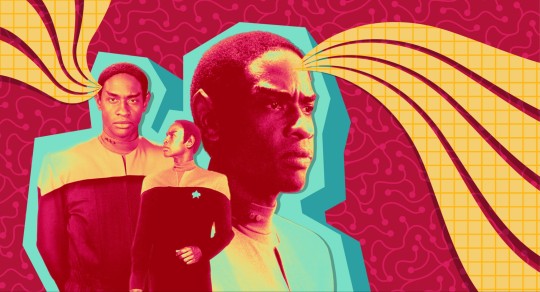
So, Vulcan polytheistic spiritual practice has continued past the Awakening and into the Vulcan Reformation. Is it the same as what it looked like to pre-Reform Vulcans? What's different? I wish we got more glimpses of Vulcan religion beyond mostly backdrop (while we are explicitly shown rituals and ritual locations in episodes like "Amok Time", "the Gambit" and many places in Enterprise, and in movies like "the Motion Picture" and "Search for Spock", very rarely do we see explanations for what the Vulcan lay people and priest(ess)es are doing and why) but that simply means that I instead get to make things up. Which is my favorite thing to do. So while the entirety of this post is built on a core of canon and information from Memory Alpha and Beta, as well as the Vulcan Language Database, most of what follows is my own musings and thoughts.
Firstly, in my research I've established that there seems to be two major pantheons within Vulcan spirituality, the Ka-ta-pak, or Inner Chorus, and the grouping I've named Ek-tam'a-ta, which is where I've placed every other named Deity not belonging to the Inner Chorus. The Inner Chorus, being made up of Deities that seem much more akin to emotional archetypes, become a much more thorny topic to consider when it comes to reconciling the worship, or, at the very least, acknowledgement of these Beings with the rigorous control of emotions that is to be expected within the Surakian cult of C'thia. As such, they are what I plan to focus on here.
The Inner Chorus is made up of the following Deities: Tel-Alep and Alep-Tel, Kir-Alep and Alep-Kir, Valdena and Dena-Vel, Kal-ap-Ton and Tyr-al-Tep, and Ket-Cheleb. Other than the last Deity, each is a part of a pairing where one represents the lighter, more acceptable form of a suite of emotions, whereas the other is the darker, shadow side. It's a concept similar to reading Tarot cards, where a card's reversal typically points to the darker reading of the themes the card communicates when right side up. For example, Valdena is famously the love Goddess and rules over emotions such as joy, beauty, fullness, pleasure, etc, whereas Dena-Vel, her shadow twin, rules over the darker side of love, namely concepts like possessiveness, covetousness, envy, domination, etc. What I would posit as probably one of the fairly radical reforms within Surakian thought, is the idea that C'thia is meant to subjugate and control both sides of what the Inner Chorus represents, not just the shadow side.
Isn't it illogical, however, to worship archetypal manifestations of emotions that one is trying to suppress? This was the big question that came out of my exploration of Vulcan Deities and led me to conclude that there is a difference between how Vulcans interact with Ek-tam'a-ta Deities vs the Ka-ta-pak, wherein the former is treated much more like how one stereotypically interacts with Gods, ie with reverence, worship, offerings, prayers, etc, as well as an understanding of the Deities being Beings outside of the mind in their own rights, while the latter is much more localized and symbolic. The Ka-ta-pak are not so much outward Beings, as they are emotional symbols and touchstones, metaphors to be focused on in meditation rather than as Gods to be worshipped.
Even the name, the Inner Chorus, suggests this kind of community of emotional beings, of aspects of the interior Vulcan mind, and furthermore, points to a need for a harmony amongst them. It is my thought that the Ka-ta-pak are less like sentient beings with personhood and more like the Platonic ideal of the emotion they represent. They are the emotion in its most perfected form and by experiencing this, experiencing the presence of this being, this outward-focused inner spirit, in the relative safety of meditation, the average Vulcan is able to meet that emotion and learn how it manifests within their own body and mind. In this meeting, they are able to name the emotion, learn it, experience it, and understand how to master it so that when they experience it outside of meditation, they need not be conquered by it and brought into chaos but instead are able to hold to order and logic in the face of it.
In the Enterprise episode, "Fusion", we are shown that Vulcans don't typically dream and that meditation has usurped the role that dreaming would usually take in the Vulcan psyche. It follows, therefore, that they process the emotional stimuli of the day through meditation and that symbolism, which is an important language for the sub-conscious and the language that dreams are written in, would probably play a role in that. Thus, the use of the Inner Chorus as a symbol of focus, as the emotional tangle that one seeks, through meditation, to sort out and bring order to, makes sense. I believe that this constitutes some of the work of t'san s'at, or the intellectual deconstruction of emotions that Surak preached. T'san s'at is the study of one's own emotions, and the effects these emotions have over one's actions. The peace and tranquility that lies at the end of t'san s'at is the goal of every Surakian Vulcan, and is a lifelong aspiration. It is through working with the Ka-ta-pak with this goal in mind that brings these ideas together.

Another idea I found interesting about the Ka-ta-pak is that the names of the Deities match the names of the other planets within the Vulcan solar system (according to the Memory Beta article that I believe is based on a Trek inspired ttrpg). A solar system, with its constant routine of stable orbits and cycles, would be an obvious metaphor for the idea of Order. The Inner Chorus strikes me, then, as the microcosm within the Vulcan mind/spirit as connected with the macrocosm of the living universe around them. It is the connection between the Vulcan mental and katric interior space and the exterior physical space. Just as the solar system is in constant harmony, subjugated to the laws of gravity, order, and simply the natural mechanisms of the living universe, one's own interior system should likewise be ordered. That it is called an inner chorus is very telling to me, since when choruses are working correctly, they are making music in harmony, just as the broader cosmos makes the music of the spheres, which is the sound of mathematics purified. It is the goal of every Surakian Vulcan to harmonize their inner chorus (part of which involves meditating on the form of the Inner Chorus) with the music of the macrocosm. In this, I believe the mind, or the reasoning capacity, represents a kind of conductor, who directs the inner chorus of emotions to properly allow for the production of music. The music produced by this harmony is C'thia, which is the same substance that keeps the planets in their orbits and the universe ticking onward.

This post is getting a bit long but there's one last thing I want to talk about and that would be Surak himself. As mentioned earlier, there is a common misconception I've seen that, again, makes Surak some kind of radical atheist philosopher who, in stomping out the violence and ignorance that marked the culture of his planet, must also have gotten rid of its religion, not just superstition or conservativism but religion more generally. Again, this comes more from the mistaken belief that spirituality and science are necessarily at odds. But what we see of Surak doesn't actually support this erroneous belief. Instead, one of the things that Surak is famous for is his pilgrimage. A pilgrimage is a religious journey undertaken for religious purposes. Surak set out to visit many religious orders and temples, before traipsing into the wilderness in places like Vulcan's Forge and Mount Seleya, to learn from and connect with the various priest(ess)es, as well as to connect in solitude with his own mind. C'thia is always shown as a revelation. Surak perceives it for the first time and discerns its meaning while on pilgrimage, while in meditation, while studying spiritual truths. He discovers it, not in a laboratory, but in deep contemplation on a mountain peak. Thus, Surak strikes me as much more akin to a Hindu yogi or an enlightened New Age seeker than he does a Richard Dawkins type. He doesn't dismiss the spiritual lessons he learns from visiting the other religious orders but instead incorporates them into his new cult. I think it's this incorporation of c'thia with traditional polytheism within Surak's own spirituality that allows for modern Vulcans to do the same.
In conclusion, anyone who claims that the post-Reform Vulcans shown in canon are atheists have not been paying attention to the actual canon, first of all, and secondly, are doing nothing more than showing their bias toward the science vs religion binary. I think the Vulcans are a little too smart to fall for this dichotomy, and they are certainly aware of the need for a philosophy to be an open one, if it's to be sustainable at all. I think having access to the neverending mystery of space, peopled as it is with many different kinds of beings, has allowed the Vulcans to be open-minded toward religion and the existence of Gods and other numinous beings. After all, they fully accept the existence of katra and thus, souls, spirits, and the idea of beings existing without bodies. It is not an illogical leap to suppose that since animating spirits (ie souls that are housed by and animate a body) exist, other kinds might also, including Deities. And since Vulcans possess a psionic system, capable of the extrasensory perceptions involved in their version(s) of telepathy, they may be able to perceive these spirits telepathically, even when psi-null folks may not be able to.
So, I don't think Vulcan polytheism is relegated to some point in the planet's distant past but instead continues, alive and well, into the post-Awakening world.
#star trek#pop culture paganism#vulcan polytheism#vulcan religon#vulcan spirituality#vulcan culture#vulcan#vulcan mythology#surak#surakian philosophy#c'thia
130 notes
·
View notes
Text
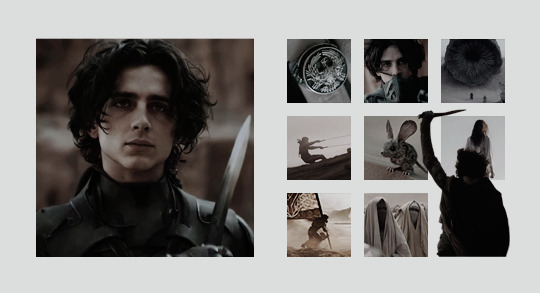
“It’s coming. I see a holy war spreading across the universe like unquenchable fire. A warrior religion that waves the Atreides banner in my father’s name. Fanatical legions worshiping at the shrine of my father’s skull. A war in my name. Everyone is shouting my name.”
⤷ Paul Muad’Dib Atreides. Duke of Arrakis. Lisan al-Gaib.
Paul Atreides was born with two formidable birthrights: the noble lineage of his father, the Duke, and the occultist legacy of the Bene Gesserit, a fanatical religious sisterhood, through his mother. From his early childhood, he was groomed to wield power and was trained not just as a Mentat for his analytical intellect and intuition, but also in the mysterious ways of the Bene Gesserit, whose bloodline manipulation and intense training granted him extraordinary abilities. He not only possesses the art of prescience, which grants him glimpses into the future—a power that both empowers and burdens him—but also wields The Voice, the ability to persuade and command someone with an order.
Now, on the desert planet Arrakis, he seeks vengeance for the brutal massacre on his family and uses the Fremen, the planet’s indigenous people who believe him to be their prophesied messiah, to wage his war against the Imperium. As the prophet Lisan al-Gaib, he leads the Fremen with an iron fist and leaves the rest of the known universe in fear and terror of him and his millions of fundamentalist followers.
“He was warrior and mystic, ogre and saint, the fox and the innocent, chivalrous, truthless, less than a god, more than a man.”
(OOC: Paul’s portrayal is primarily based on the two latest movie adaptations by Denis Villeneuve, but also on Frank Herbert’s novels Dune & Dune Messiah. // 21+, mdni, english preferred, muse =/= mun ‼️ I do not support or celebrate Paul as a white savior. Dune works as a critique toward western exploitation, colonialism and white saviorism, which will be reflected through my portrayal of Paul as well)
61 notes
·
View notes
Note
so, it’s confirmed that Zelda’s “Time” powers came from Sonia, and her “Light” powers from Rauru, but we know from other games that only the women of the royal family can use the “sealing” power inherited from SkSw Zelda. do you think this means that throughout history, the “Light” powers associated w the sealing are actually separate from the sealing ability? I just remember being really lost after that cutscene, cause even if Rauru somehow was a descendant of Hylia, he wouldn’t be able to use those powers, and the sealing of whatever evil is causing trouble always has a fancy light show with it lmao
So, this is a very complicated question with a very complicated theory to answer it.
We know that Sonia's primary, and, in terms of usablity, only power is Recall.
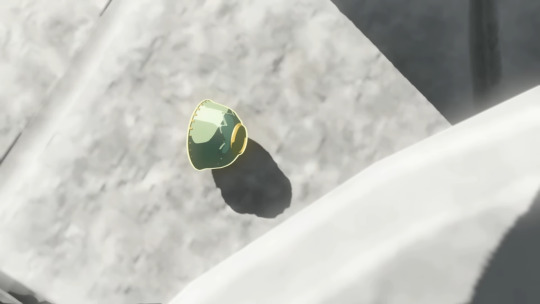
However, I do believe she's Hylia's descendant, not Rauru, despite Rauru being the one with the light/sealing power. Evidence on that here.
Being Hylia's descendant would make Sonia's birthright be a whole host of other powers, possibly latent, but more probably something that Sonia's never actually been in the right situation to use. Let's take a look at what Skyward Sword Zelda can do.
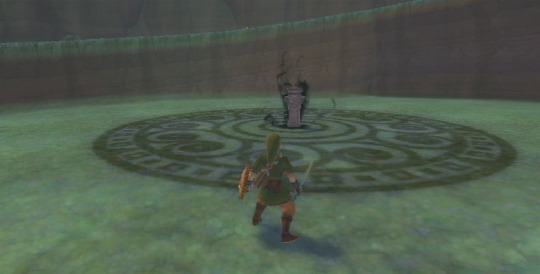
She can seal the Demon King-

-but only at the expense of her own life force being rendered inert while she does.

She can bless the Master Sword-

-but it's already as strong as it can get.
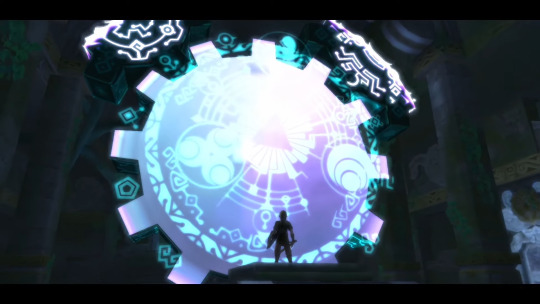
She has strong connections to time...

...but we knew that already.
Of these three powers, only one would be relevant to Sonia's skill set. The Master Sword can hardly be doubly-blessed, and the Demon King has yet to show his face.
More importantly, however, Skyward Zel's sealing power works MUCH differently to Wild Zel's.
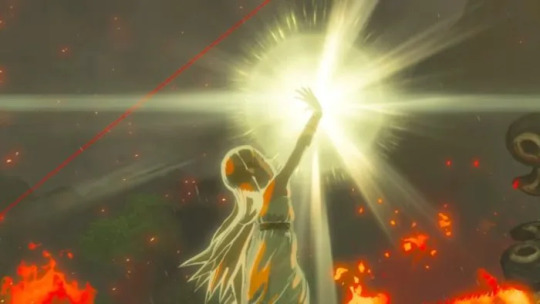
Wild Zel's sealing is instantaneous, fueled by emotion, with seemingly no draining effect on her person.

When fully unleashed, her seal is as total as it is inescapable. It doesn't require her to put herself to sleep until Link can deal the final blow with the Master Sword. The closest thing to Skyward Zel's seal that Wild Zel did was in keeping the Calamity at bay for 100 years while Link slept. During which, it's heavily implied that she was conscious, given that she spoke to Link the instant he woke.

With Rauru, his sealing ability seems much more similar to our princess's, with only some key differences visually.

His right hand gathers light around it, and needs to be extended to fully function.

When the seal first activates, it forms a spherical shape, which is inescapable, albeit on a much smaller scale than Zelda's.

It's a little hard to see, due to the magnitude of Zelda's power, but it IS a sphere.

And although this act does cost Rauru his life, it usually doesn't. He's done this before, multiple times, as stated in Messages from an Ancient Era tablet A Pilgrimage of Light:
"The kyng was late y-come this aven, so maked the quene to sharen tales of hir lond, of shirines al grene yglouen. "Of erli daies sinnes Hyrules funding have diverse monstres hir reaume biseged ond assaylled. "Uncesinge in striffe, thei broughte to despeir folkes lyfen. Kyng ond quen ysete thamselue to bringen scurge to ende. "With might of light ond pouere, driven abak ybeen, ond the roial couple made thes shirines to selen him awei. "Thes holi selen ben yclept Shirines of Light. "Gret kyng, grete quen, y thank ye. Ye foughte whan y wer maiden-child, that y kude pes toknouen."
The translation, to the best of my efforts:
"The king was late to come this evening, so made the queen to share tales of her land, of shrines all green glowing. "Of early days since Hyrule's founding have diverse monsters her realm besieged and assailed. "Unceasing in strife, they brought to despair folks' lives. King and queen set themselves to bringing scourge to end. "With might of light and power, driven aback they been, and the royal couple made these shrines to seal him away. "These holy seals been called Shrines of Light. "Great king, great queen, I thank you. You fought when you were maiden-child, that I could peace to know."
Sonia and Rauru went around making the Shrines of Light that we find in present day and receive blessing from:
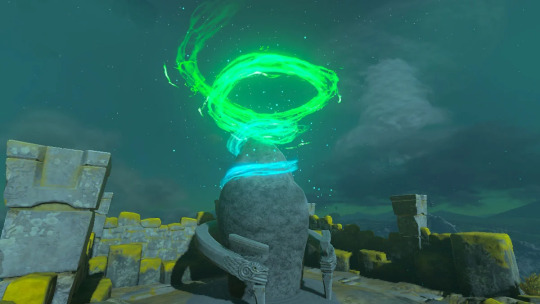
So, with the exception of the Demon King, who was so powerful that he could resurrect thousands of years later, Rauru's seal behaved like Zelda's—instant, fueled by emotion, inescapable, projected by the right hand, with no immediate toll on the user.
But what does this mean for Zelda's sealing ability? Despite behaving similarly, it doesn't look similar at all.
Let's look back at what happens when Sonia and Rauru combine their powers.
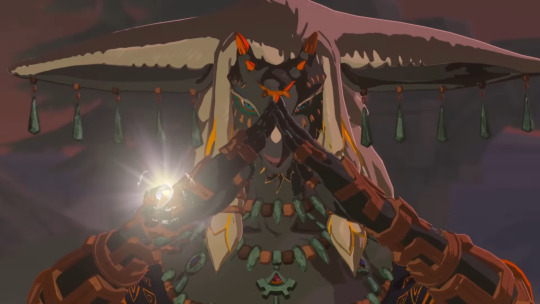
Rauru brings his hands together in a triangle shape, possibly invoking the same Triforce motif Zelda gives when she unleashes her power. The Secret Stone, which magnifies his light abilities, glows in a similar shade to Zelda's seal.

Sonia extends her right hand as her own tear glows. Despite it only amplifying her time power, her hand shows the same color Rauru's light gives off—as well as being in a spherical form.
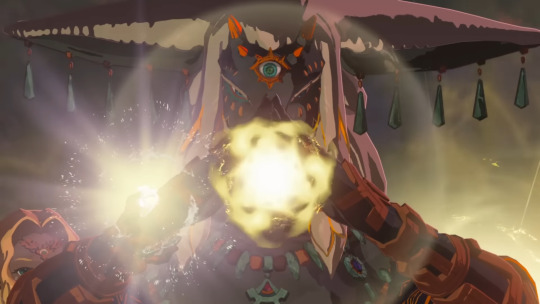
Rauru draws in her power (and Zelda's, whose is a combination of both already and therefore adds no new properties) and forms a bright yellow light with a sphere around it.

It's better seen from this angle, where we can also see what looks like an inverted Triforce in the middle.

They're nowhere near the level of focus Zelda's Triforce has, but the triangles are definitely there.

And then it becomes a catastrophic force of power, able to wipe out an entire swarm of Molduga in a single hit.
Zelda's lineage's sealing ability is a culmination of all of this. It's Sonia and Rauru's powers combined, taking Hylia's seal, the Goddess's full power-
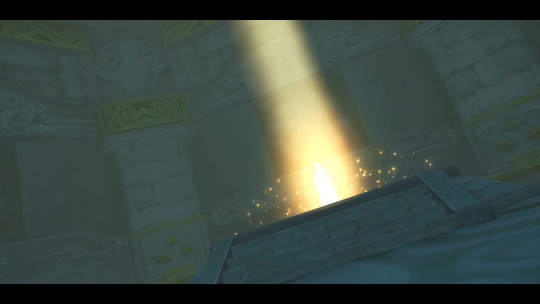
-and attaching that strength to something instantaneous and geared specifically to lock away darkness-

-by combining the power of time with the power of light.

Hylia's sealing power isn't Rauru's, but Zelda's is Hylia's AND Rauru's combined.
As a side note, this is also why I think, despite Rauru contributing his power, the magic remains only matrilineal. Hylia's descendants—meaning in this case, Sonia—are the only ones that carry her abilities. Rauru's power attached itself to Sonia's to create Zelda's, but Sonia's abilities—with or without Rauru's boost to them—can only be accessed by her daughters and granddaughters.
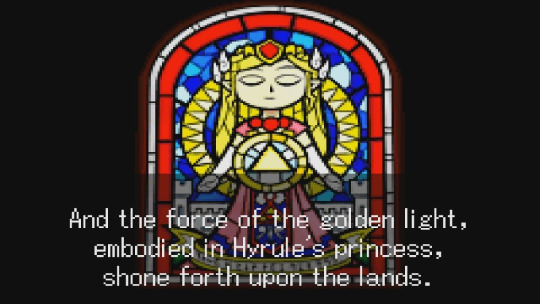
Strong enough to rival any magic in the world in sheer might, this later became known as the Light Force.
TLDR: Hylia's seal = Slow, nonlethal, exhausting toll, powerful, golden lightshow Rauru's seal = Fast, potentially lethal, concentrated, opposes Ganon, spherical lightshow Zelda's seal = Fast, concentrated, opposes Ganon, spherical (from Rauru), nonlethal, powerful, golden (from Hylia); a hybridization of both seals, the best of both worlds
#loz#zelda#theory#ask bee#totk#totk spoilers#skyward sword#minish cap#long post#really long post#words are hard and it's 3 am but i hope i'm conveying this right#basically rauru is what improved hylia's seal to the point that botw zel uses it with as much strength as she does
273 notes
·
View notes
Text
i burned my fingers on this forbidden fire
it's been a loooong time coming, but i am very excited to share the first chapter of i burned my fingers on this forbidden fire! ❤️🔥 All dedicated to the Holy Rolan Empire, of course! x
Summary:
It's finally over: the Absolute has been defeated and Baldur's Gate has been saved. A month after the final battle, everyone's gone to pursue their own destinies - everyone but Tav. She might be home now but she's never felt more lost, struggling to pick up the pieces of the life she left behind. Rolan got everything he wanted: his family is safe and sound, and he is the new Master of Ramazith's Tower. He won, and all he has to do now is prove that he's up to the task. It should be easy, so easy - but then why does he feel like he's constantly failing? One night they meet again, and a proposition rekindles the spark between them. But when Tav's world crumbles around her and secrets are revealed, it's Rolan's hand she reaches for. Will he be there to catch her? (or, Tav meddles and Rolan stands his ground)
In this first chapter, Tav is doing fine. She's doing great! So good. Never better. She's the hero of Baldur's Gate, and everybody loves her. Sure, maybe she's alone because all her friends are gone, and maybe she's still staying at the Elfsong because she can't really move on, and maybe her new job makes her feel useless, but honestly, she's fine. It doesn't even matter that Rolan has been ignoring her this whole time.
I hope you'll like it! Little preview under the cut x

The Elfsong was busier than usual, noticed Tav as she turned the corner, pushing her way through the merry crowd gathered outside. Ale and wine flowed freely as if it was a perfectly ordinary evening in Baldur’s Gate, which, she supposed, it was - to some extent.
Ordinary didn’t mean much anymore these days.
Then again, she hadn’t had an ordinary day in a long time.
In the distance, someone yelled her name and she waved blindly at the crowd, earning a few drunken cheers. That never failed to make her smile, and, slipping inside the tavern, she made her way to the bar where the owner was busy trading beers for gold.
“Hey Alan! Is there a special occasion I’m not aware of?”
Gatherings under the influence of alcohol were frequent as of late, but never to this extent. It almost felt as if the whole of the Lower City had agreed to meet at the Elfsong tonight.
Alan shrugged, undisturbed in his pouring of pints.
“They just finished rebuilding the last of the docks. Calls for a celebration, don’t you think?”
Ah. She turned her head back to survey the crowd, now noticing the many unfamiliar faces.
“You know I never say no to a party,” she said. “No news about the Upper City though, I assume?”
“Correct, princess. But as long as you keep that sweet gold comin’, I’ll make sure you’re treated like a real lady.”
That made her chuckle, and she winked at the bartender.
“Oh, Alan. I am a real lady.”
Leaving him to his work, she made her way up the stairs and to her room. The loud conversations were soon reduced to a hushed background noise, the quiet privacy unnerving as ever.
Everything was exactly as she left it this morning: a calculated mess; a neatly-kept shrine of who she was a month ago. Rationally, she couldn’t expect things to start moving on their own, but to be fair, she had witnessed stranger things. Maybe it would happen somehow: a sign of things moving on, a physical manifestation of the start of a new life.
Her fingers lingered on the bedcovers, the last sunlight of the season peeking through the windows, bathing the place in a comforting autumn glow.
That didn’t ward off the cold inside her chest.
Slowly, she sank to the floor, head resting against the mattress.
If she closed her eyes, she could still hear Wyll and Karlach’s laughter from the next room, and the play-fighting of Shadowheart and Lae’zel. Halsin would be quietly humming a soft song near them, and if she focused hard enough she could make up Astarion’s footsteps about to barge in her room unannounced - wallowing in self-pity, darling? Gale would softly tut, an arm around the vampire’s waist, asking her if she wanted to come to dinner.
On the other side of the wall, there was a loud sneeze.
She sighed. The new tenants were dull, loud and annoying. She didn’t see the point in trying to be friendly - actually, she actively schemed to avoid any contact.
She let her legs fall on the floor with a soft thump, feeling like an abandoned rag doll.
Who’d come and pick her up, if she decided to not move anymore? Now that was a good question. For how long she could stay in her room until someone came to check on her? A few days? A whole tenday? More? Her face had been everywhere after the defeat of the Netherbrain, and even days later, still adorned some sparse street posters. Despite her battle scars, she remained easy on the eyes and people naturally sought her out when she was in public.
Behind closed doors though… no one bothered to care.
While she enjoyed toying with the idea of playing dead for a while, she was fairly sure that someone at the Council would eventually notice her absence, if only to point out how unreliable the Hero of the Gate was.
When the light outside began to dim, she got up with a groan, finally finding some kind of resolve - anything to distract her mind. She had a golden opportunity to drink the night away and might do exactly that.
At her mirror, she found her lipstick - the one that Shadowheart gave her because it felt too Sharran. It was a lovely shade of deep burgundy, rich and smooth, and if she focused hard enough on how the colour complimented her skin tone, she could almost ignore the wave of nostalgia that crept up on her.
On a whim, she undid her braid, letting her loose curls fall on her shoulders. Using Astarion’s little discarded comb, she slowly untangled them. Her hair had grown back since that unfortunate episode in the Underdark, but she sometimes missed how the shorter cut made her feel. Daring. Determined. Brave.
She wasn’t this person anymore.
— Read the rest on AO3 :)
if you liked it, you also can follow the tag “series:forbidden fire” here on tumblr to not miss any updates :)
(c) divider by @/saradika
#holy rolan empire#rolan nation#tav x rolan#rolan x tav#bg3 rolan#rolan#series:forbidden fire#fic:forbidden fire#tag:writing#baldur's gate 3
24 notes
·
View notes
Text
Like a lot of us, Carlo Acutis spent an ungodly amount of his life staring at screens. Born in London in 1991, he grew up an only child in a newly connected world. He wore sweatshirts and Nike trainers. He played Halo and taught himself to code. But that’s where the similarities end—because next year, Acutis will officially be named a saint.
As well as the internet, Acutis revered another institution: the Catholic Church. From a young age, he was acutely interested in Eucharistic miracles—extraordinary events which, according to Catholics, see consecrated bread or wine suddenly become the actual body or blood of Christ. “To always be united to Jesus: This is my life plan,” he told his mother after his First Communion.
In 2004, Acutis started to research Eucharistic miracles from around the world, developing a website to document them. His aim was to connect with other young Catholics. “He was personally convinced that the scientific evidence would help people … come back to Mass,” says Courtney Mares, author of Blessed Carlo Acutis: A Saint in Sneakers and Rome correspondent for the Catholic News Agency.
The online archive was unveiled in October 2006, a simple build with cursive text and religious imagery. But just a few days after it launched, Acutis fell ill. He was diagnosed with leukemia, with little chance of recovery. “Death has become the passage towards life,” he told his mother, before falling into a coma, suffering a brain hemorrhage, and passing away. He was just 15.
His spirit lived on. The website he’d built helped introduce Eucharistic miracles to a mass audience across the globe and was translated into 17 languages. A physical exhibition linked to Acutis’ work has toured internationally, being shown in thousands of parishes worldwide. It’s still touring now. Acutis is revered not just for his use of technology, but also his dedication to living virtuously. “I think that prayer was truly the great secret of his saintly life,” Mares says. But the website was key to creating a halo effect, heightening his reputation as a blessed figure.
In 2012, the Archdiocese of Milan—where Acutis’ family had moved when he was a child—started a cause for canonization, paving the way for sainthood. Unbeknown to most secular folk, saints are still made regularly; Pope Francis has recognized a record 912 since 2013. But becoming one, as the cliché goes, requires patience. The original petitioner appoints a postulator to collect evidence of the candidate’s sacred work (the “devil’s advocate” used to be a real antithesis to this occupation, arguing against sainthood).
“The process of identifying someone as a saint is long and careful and quite bureaucratic,” says Tim Hutchings, associate professor of religious ethics at the University of Nottingham. “It starts when some Catholics decide that they really think someone should be a saint. They start a campaign to prove to their local bishop that this person lived an incredibly holy life, or died for their faith.”
After being named a "Servant of God" in 2013, Acutis reached the second rung on the ladder to sainthood when he was venerated by Pope Francis in 2018. His body was exhumed and brought to a tomb in Assisi where he still lies today, dressed in his trademark '90s teenager garb. “It’s a beautiful thing that for the first time in history you can see a saint dressed in jeans, sneakers, and a sweatshirt. That’s a great message,” Father Carlos Acácio Gonçalves Ferreira, the shrine’s rector, said at the time. A Franciscan monk based at the tomb, noted that “many young people” were visiting.
Next, Acutis and his followers needed a literal miracle—one he had performed himself. “It has to be something which can't be scientifically explained, so proving this is difficult. For example, this might require doctors to confirm that they can't explain how a healing has occurred,” Hutchings says. In 2013 a woman in Brazil claimed that praying to Acutis had helped heal her son’s pancreatic defect. In 2020 Pope Francis authenticated the miracle and Acutis was beatified, culminating in a ceremony celebrating his virtuous life. “According to Google Trends, more people were searching for information about Carlo Acutis than about the Pope,” Mares notes.
Then, in May 2024, a second miracle was recognized, involving the healing of a 21-year-old girl from Costa Rica injured in a bike accident. In 2022, her mother had knelt at Acutis' grave and prayed for his help. Her daughter then miraculously resumed breathing without support and made a full recovery. The Pope approved Acutis’ canonization in July—with an official ceremony set for 2025.
It’s rare for a saint to be so young and unheard of, and still reach this lofty status so soon after their death. “It is remarkable that Carlo Acutis will be canonized so close to the date that he was born. For context, of the 912 saints canonized by Pope Francis, the next most recent birth date was in 1926,” Mares says. It makes him the first ever millennial saint and, as some Catholics have put it, “God’s influencer” and the “patron saint of the internet.”
Meanwhile, the cult of Carlos Acutis is continuing to spread across the world. Relics, including a piece of the sheet that shrouded his corpse, a fragment of one of his sweatshirts, and his actual heart, have toured internationally, recently coming to the UK for the New Dawn Catholic Pilgrimage. Online, you can buy Carlo Acutis figurines, rosary beads, posters, and commemorative keychains. In North Lanarkshire, Scotland, a life-size statue of Acutis has been erected at Carfin Grotto, and there’s a stained-glass window in Wiltshire to attract young churchgoers.
There's even a comic book telling his story, and a VR experience offering players a chance to step into Acutis’ sneakers. And, for Catholics who are unable to pay their respects in person, his tomb can be visited (and donated to) virtually through an always-on livestream.
The Church doesn’t pick saints—campaigns start with the Catholic community—but Acutis’ popularity meshes with its desire for a young role model. It also highlights the Church’s embrace of tech. “The Pope has been making an annual lecture about communications technology for 58 years,” says Hutchings. “It absolutely makes sense for Catholics to look for a saint of the internet who represents the godly and faithful use of technology.”
There is, of course, still a stigma surrounding the internet’s potential for blasphemous behavior. “The Pope has warned that today’s digital age constantly tempts young people to ‘self-absorption, isolation, and empty pleasure,’” Mares says. And some devout Catholics are still struggling with temptation. “With technology changing at such a rapid pace today, many Christians are still grappling with how best to live out their faith in the world of laptops, cell phones, and social media,” Mares says.
But the Pope also called the internet a “gift from God” in 2014, and he recognizes its potential for spreading the word of Christ—it just depends on how it is applied. And in the case of Acutis, tech was used in a pious way. “Acutis used the new technology in exactly the way that the Church wants to see it used: to promote commitment to Catholic teaching, virtuous living, and devotion to the rituals of the local church,” Hutchings explains. The Church will hope that the relatable “saint in sneakers” who watched cartoons and surfed the web will resonate with a community looking for an idol.
23 notes
·
View notes
Text
Digimon Adventure 01 - Adrift? The Island of Adventure! / And So It Begins....
Right off the bat, we can feel the tonal difference between how the two shows want to present themselves. The Japanese version opens with narration provided to us by a grim and stone-faced narrator, while in the English version, Tai delivers the exposition himself in a light-hearted and goofy tone.

The Japanese narrator explains to us in a bit more detail precisely what is happening throughout the world. Drought has struck the paddy fields of southeast Asia, heavy rains are flooding the Middle East, and the U.S. is suffering from freezing temperatures.
Tai has similar dreary info to drop on us. He tries to keep it light because that's the tone the dub is going for, but his version's... a little different. In fact, hilariously, Tai's version is much worse.
The way he tells it, the whole rainforest has dried up and oceans have risen to flood "other areas like chocolate sauce". The freezing also is no longer in the U.S.; It's "cities which are normally blazing hot", not contained to any specific region. Holy shit.
So, yeah. Either way, the world's being fucked sideways right now by climate catastrophe, but it's ironically being fucked harder in the lighter and goofier English dub.
With that out of the way, we met our cast of kids - With the English Tai getting in a funny joke, claiming to be "working on my multiplication tables" while we clearly see him snoozing in a tree.


Each character comes with their own special introduction slide to give us some basic information on them. For the Japanese version, the narrator coldly lists them off by name, while their information blurb tells us what grade they're in.
This gives us a general understanding of how old each kid is, relative to one another, which is kind of important for understanding their group dynamic down the road.
6th Grade: Jou 5th Grade: Taichi, Sora, and Yamato 4th Grade: Koushiro and Mimi 2nd Grade: Takeru
The dub omits that particular information and instead gives us some basic information on what Tai thinks of each character.
Sora: "She's okay, for a girl!" Matt: "Too cool; Just look at that haircut!" Izzy: "He should have gone to computer camp." Mimi: "I'll bet you can guess her favorite color on the first try." T.K.: "Matt's dopey little brother." Joe: "Don't ever scare him; He'd probably wet his pants."
For most of the character names, it's pretty obvious which name connects to which. Izzy's the odd man out, as it's an abbreviation for Koushiro's family name Izumi.
The omission of the characters' ages from the dub is something that I think hurts it; It's not super clear, watching the show in English, that Joe's supposed to be the oldest kid by a year or two, or that Mimi's one of the youngest in the cast. However, this is important context for driving some of the plot points that the show has in store for them.
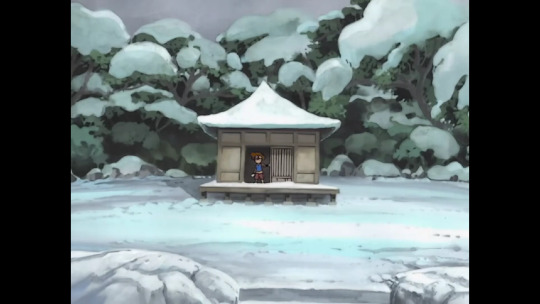
As the kids are struck by a freak blizzard, neither version really stops to explain this but the kids who will be our protagonists get separated from the rest of the campers. In both versions, we just see a group of counselors ushering kids into tents, and then Taichi opens this door once it stops.
I think the Japanese version was trusting its audience to understand from context where they are. Taichi, Yamato, Sora, Jou, Koushiro, Mimi, and Takeru have all taken shelter from the blizzard inside a nearby Shinto shrine.
This is why, when the aurora suddenly arrives and transports them across worlds, no other campers are taken with them. They're in an isolated location away from the rest of the group.
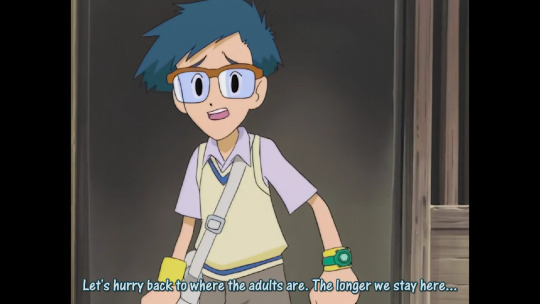
Jou even has a line expressing that he wants to return to the others, to clarify that these seven children are presently alone.
The English version offers no less information than the Japanese. Well, it offers a little less; That one context-clarifying line from Jou is replaced by Joe saying "I was worried I'd catch a summer cold but this is even worse!"
However, more importantly, we don't have Shinto shrines here. So the context isn't quite as evident to a kid watching on TV in the 90's. I always thought they were just in some kind of cabin at camp.
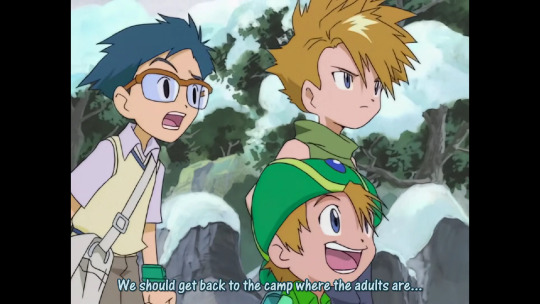
As the kids stare in awe at the sudden arrival of an aurora that's about to ruin the next several months of their lives, Jou again urges everyone to return to adult supervision pronto. This time Yamato agrees with him, pointing out that they could get sick if they stay out here.
Joe and Matt, on the other hand, have different concerns. In the dub, it's Joe that worries they're all going to get sick if they stay out here. This time, Matt disagrees, insisting that they can't miss a sight like this. That they are all alone in the wilderness with no adult supervision is not a concern for Joe at all, apparently.
Koushiro also points out that auroras aren't supposed to happen in Japan, so this is weird. The dub is trying to localize for an American audience, so Izzy's a bit more descriptive here. He calls this out as the Aurora Borealis specifically but says that's supposed to happen in Alaska. "We're way too far south."
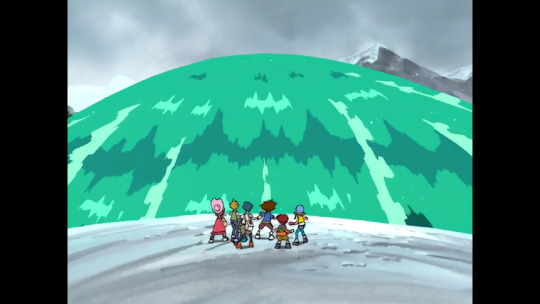
Then the Aurora strikes, delivering their Digivices and whisking the kids away on a magical adventure of violence, terror, and coming to terms with the reality of death. YAAAAAAAAAY

So it begins! Taichi is the first we see meet his Digimon partner. This is Koromon. English Koromon explains that his name means "Brave Little Warrior". This is a bald-faced lie.
Like many Baby and Child stage Digimon, his name is based on an onomatopoeia; Specifically, Koromon is named for the sound of a round object rolling around. "Korokorokorokoro". I think the dub version of the character was embarrassed to admit that. :P

Koushiro's partner Mochimon is next. The subtitle here says Motimon but you can clearly hear Mochimon. His name is based on the sound of a spongey goop extending and retracting. Mochimochimochi.
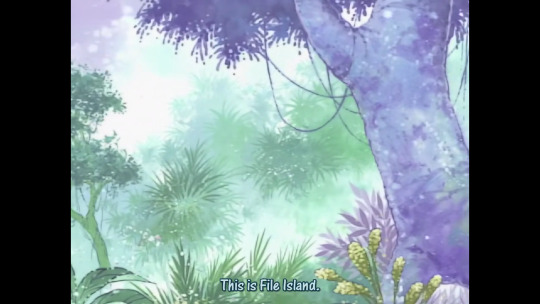
Once these two are introduced, the dub goes in on trying to deliver information to the audience. This place is called the Digi-World, and Izzy speculates that the Digimon are the Digivices themselves, transformed into physical lifeforms.
None of this is in the original; This is a quiet moment as Taichi takes in the magnitude of their isolating predicament. The only information offered is that this is a place called File Island; the word "File" is said in English.
That they've Isekai'd into another world entirely is not something they know as of yet. At this point in time, the possibility exists that maybe we got washed out to sea somehow but we're still somewhere near Japan.

When Taichi tries to scout out what's around them, our central antagonist for this episode arrives: Kuwagamon, an Adult-stage Digimon named for a particular species of stag beetle: Nokogiri-kuwagata.
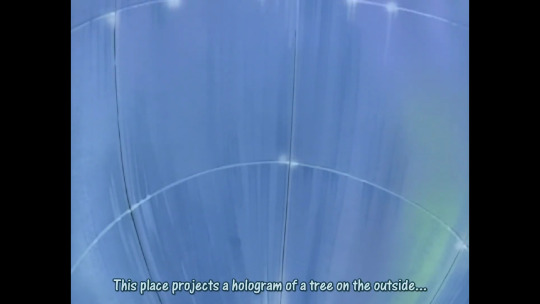
The first altercation with Kuwagamon goes terribly, forcing Taichi and Koushiro to take cover inside a special program. As Mochimon explains, they're inside a hologram of a tree which will conceal them from Kuwagamon.
The English Motimon offers the less helpful explanation, "It's a Hiding Tree, silly!" That'll do it. All I need to know, thanks.
Once Kuwagamon's gone, we meet up with Sora and our next Partner Digimon.
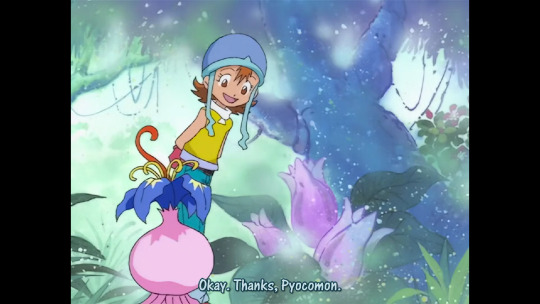
Pyocomon, named for the sound of bouncing. Pyocopyocopyoco! The dub cuts off the P and calls her Yokomon.

Immediately followed by Takeru's partner Tokomon, named for the sound of trotting around. Tokotokotokotoko.
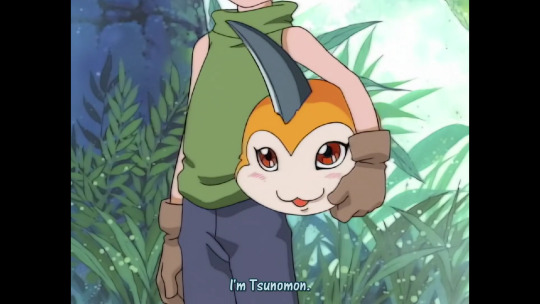
And Yamato's partner Tsunomon. This one isn't an onomatopoeia; Rather, "tsuno" is the Japanese word for "horn". He's Hornmon. You can probably guess why.

Following that, we have Pukamon, named for the sound of floating or hovering. "Pukapukapuka", though the dub calls him Bukamon with a hard B sound.
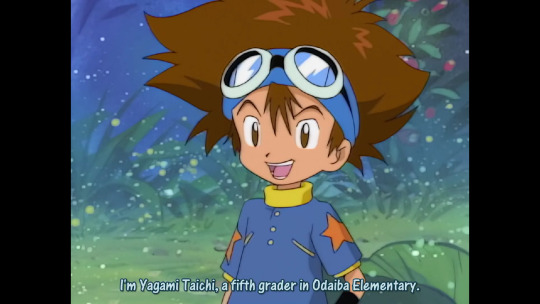
We cut to commercial break and then come back to a completely redundant second introduction. Each Digimon takes turns going around and saying their names, and then Tai introduces each of the human characters and tells us which grade they're in; The same information from those slides earlier.
I think the localizers realized how unnecessary this is because they use this time to waffle instead. Rather than intros, the Digimon just say things like "We're super cute!" "And loyal!" Tai, however, once again misses an opportunity to establish the relative ages of the characters and just reintroduces all of the humans by name.
Wait, but aren't we missing someone? As if on cue, Mimi comes screaming out of the woods with her Partner Digimon at her side.

Tanemon, which translates in English to "Seedmon". However, like Tsunomon, her name remains Tanemon in the dub. Mimi isn't screaming because of Tanemon, however; She's being hunted by Kuwagamon.
I should note that the dub characters are extremely rude about Mimi's absence. Sora calls her "the girl with the funny hat" to which Tai replies, in the most eye-rolling and disdainful voice possible, "Now now, her name is Mimi." You can hear him sneering.
Then Izzy chimes in and, in a weirdly bitter tone, suggest she's "picking flowers" or "going on a nature hike". The fuck crawled up y'all's butts and died? This girl has done nothing.
The dub, however, does get in a fantastic line when Kuwagamon attacks again.
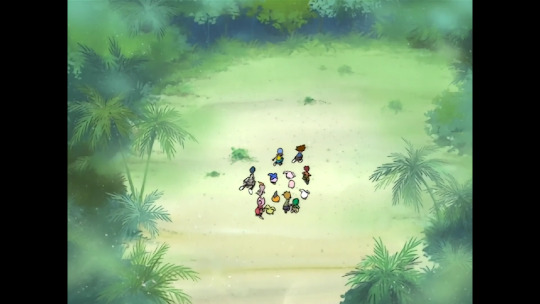
As the kids cower in a clearing from Kuwagamon's renewed assault, Joe cries out, "My mom is going to want a complete and total refund!" XD I love that. It manages to land a joke without killing the tension in the process.
Cornered on the edge of a cliff, the partners are forced to fight Kuwagamon.

It does not go well. Real quick, who do you think wins in a fight: An experienced lumberjack vs. several toddlers?
What a lovely start to an adventure. We have no idea where we are or why, and the strange magical creatures who showed up to protect us have all been beaten within an inch of their life by what, for all intents and purposes at this time, just appears to be Random Encounter wildlife.
We're gonna die out here.
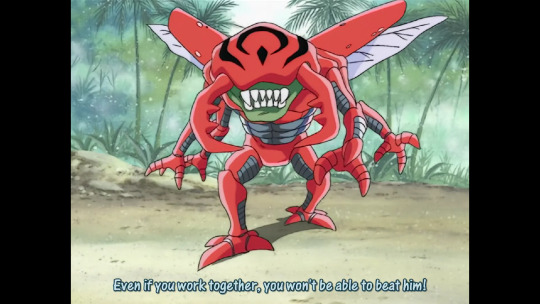
With their backs against the wall, Kuwagamon renews the assault once more and the Baby Digimon are forced to break free from their worried kids and fight once more.
The dub tries really hard to downplay the peril these kids are in right now. For instance, when Taichi asks Koromon why he attacked Kuwagamon so recklessly, Koromon uses what little strength he has to state that he needs to protect Taichi. Dub Koromon just says he wanted to show off and look cool.
Similarly, as Kuwagamon comes tromping out of the woods, Taichi expresses hopeless fear, and Koromon then insists that that Digimon must fight. Dub Tai instead says, "Get ready to run!" only for Koromon to argue that he wants to fight instead. Like. They're standing on the edge of a cliff. There is nowhere to run to. The dub's manufacturing retreat options to make fighting a personal choice rather than a survival necessity.
But now the bonds they've formed with their kids are strong enough for the first in what's going to become a major metaphysic for this series: Evolution.

The dub calls it Digivolution, possibly to distinguish it from evolution in Pokemon which was airing alongside this show, but in Japanese it's just "shinka" meaning evolution. As each Digimon evolves, there's a stock quote format that they express in both versions.
In English, it's "Koromon, digivolve to: Agumon!"
In Japanese, it's "Koromon SHINKAAAAAAAA!!! Agumon!"
I admit, ever since the first time I watched this in subs, I've always had a soft spot in my heart for the bloodcurdling battle roar of "SHINKAAAAAAA!!!" every time they evolve in Japanese.

While Kuwagamon gets dogpiled by Child-stage Digimon as the Digimon theme song blazes in the background, let's take a moment to go over each of their new names.
Agumon: "Aguaguagu". The sound of biting. Gabumon: A type of puppet used in Kabuki theater. Piyomon: "Piyopiyopiyopiyo". The sound of tweeting. Tentomon: Tentoumushi, a type of ladybug. Gomamon: Gomafu azarashi, a type of seal. Palmon: A play on "palm", a kind of tree. Patamon: "Patapatapatapata", the sound of flapping wings.
The English version replaces the roaring Digimon theme song with some generic fight music.


With Kuwagamon successfully fended off, the vibe of this scene is pure tension-relieving jubilation. The dub slides in Izzy saying, "They made vaporware out of him," and goddammit, that got me. XD The important thing is that Kuwagamon is gone and everyone is safe forev--
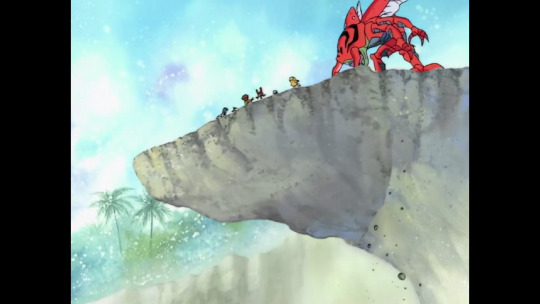
Oh, never mind. Everyone fucks off a cliff and probably dies and that's where we leave off episode 1. This sequence features possibly the funniest "Easing Up on the Peril" edit in this entire episode. As Kuwagamon slams his pincers into the edge of the cliff side to send them hurtling to their doom, the English version splices in random still frames of the kids looking tough to show this is no big deal and they can handle themselves in this mess!
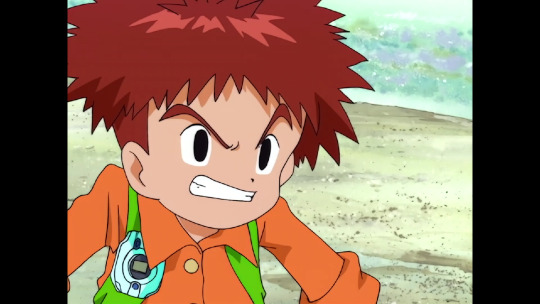
Izzy standing there like "GRRR I'm a big strong American boy and they build us TOUGH over here! Me and mah gun can TAKE gravity!"
Before ending on the exact same shot of everyone falling to their doom anyway.

Either way, this is where the episode leaves off. The kids have been transported to this mysterious location. They have no idea where they are, how they got here, or why. They were terrorized around the forest, and now they're all falling to their doom.
This sets the stage for what this adventure is going to be like. This is not a magical journey of whimsey and effortless victories. These children are in extreme peril and nobody is coming to save them.
Man, File Island sucks. I'm with English Joe. If I was one of these kids' parents, I'd be demanding a refund too. Worst camping trip ever.
45 notes
·
View notes
Text
I hate this image

So let's talk about it!
Point the first: in what world is Romeo canonically 17 years old? Nowhere in Shakespeare's play is there a citation that even hints at him being 17. Capulet calls him a "youth," so he is definitely not an adult. Also, wouldn't it make more sense to the story if Romeo was more around Juliet's age? Let's look at what is explicitly said in the play:
A. Juliet is 13 about to be 14 in give or take 2 weeks
B. She is being married to Paris, who, despite not having a confirmed age, is most definitely an adult.
C. Juliet does not want to marry Paris, which makes sense: he's way older than her, he's never spoken to her, and when he does, it's in a very possessive and creepy way. Romeo doesn't. In fact, he reveres her, which we're getting to.
With all this in mind, wouldn't it make sense for Julieet to fall in love with a boy who is most likely her peer? This brings me to:
Point the second: "Romeo and Juliet is not a love story." Well, it is, and it isn't. It's a story about love, but it's also about hate. The point of the story is that the innocent love of Romeo and Juliet is killed because of a petty feud. The story is not memorable if we do not see the hate kill the children of the families because they loved each other. And they do love each other. Yes, it was fast, but sometimes that happens. Ever meet someone and instantly vibe with them? That's what happens when they meet at the party. Their love is still very real even if it did not last that long, and we have a reason for this: the feud. They had to get married in secret because if they did it in public, their families would literally cause the end of the world. They got married in the first place, so it would be near-impossible for their families to try and stop it because they're now a union in the eyes of God. And they married because they do love each other. "What about Rosaline?" I hear you ask. Well, what about her? Her stake in the plot only lasts for about half an act at best. Plus, she was a nun. Was that really gonna bring out a romance? That is a situation where you are allowed to be upset but you should eventually cut your losses. Also, it's probably better that Romeo moved on from her in favor of Juliet. The boy was a mess in act 1, and Juliet is the person who brings him back to himself ("Now art thou sociable, now art thou Romeo"- Mercutio). Romeo and Juliet work, they balance each other out: Romeo is himself again with Juliet, and Juliet gets a taste of freedom/control of her life with Romeo. Romeo literally is ready to disregard the ideas of honor and masculinity to make Juliet happy. He does respect her. He does love her. I want you to look at these two lines and tell me that neither of these two are in love
"If I profane with my unworthiest hand / This holy shrine, the gentle sin is this: / My lips, two blushing pilgrims, ready stand / To smooth that rough touch with a tender kiss."- Romeo; I,i
"Thy face is mine and thou has slandered it"- Paris; IV, i
Would you really disregard someone who reveres you and basically says his world revolves around you/ you are a heavenly being that he worships like a pilgrim in favor of the guy who pretty much implies he owns you?? Would you?? Look, I'd hate to pull a Hamlet by pointing between these two lines and start berating people for this, but we do what we must. Romeo's dialogue makes it clear where he stands with Juliet: he adores her. He loves her so much that if he could carve his family name out of his body, he would (Act 3 scene 3). Obviously, you don't need to go all extreme to prove love, but you get the point. He willingly decides to sacrifice what he's been taught for her and she to him. They aren't each other's enemies. Their families are enemies. Romeo refuses to fight Tybalt because he loves Juliet. He is willing to sacrifice his family's idea of hatred because he loves Juliet. He does not act like he owns her or that anything he does if justified. When Juliet questions him about "leaving (him) so unsatisfied," he doesn't double down. OBVIOUSLY Juliet would choose Romeo:
He gave her choice throughout the play, unlike Paris. Juliet was confined in her life, and she only agreed to consider Paris because her parents asked her too. She never wanted him. She was just doing as told. Romeo ASKS to hold her hand. Romeo ASKS for her faithful vows. He doesn't push it towards her. He lets her take the reigns, and she reciprocates. Would this be considered bare minimum, now yes. Then? Juliet is basically being strung along to do as her parents ask, Romeo is different from that. Different to the feud. He doesn't make her do things. He lets her make her own choices. As a partner and equal; she definitely would not get that with Paris. The guy literally says that girls younger than Juliet (13) are already mothers. If that sounds like a yikes, that's cause it is. Shakespeare wants us to understand why Juliet did what she did, there is reasoning in the play.
He is sweet to her, and his "it is the east and Juliet is the sun" can be interpreted as him being so smitten with Juliet that she is the center of his universe. Her happiness is important to him; he goes to great lengths to say this.
He is also most likely in her age group. He's a youth. Even if he IS older, he is probably like 14-15 at best. He's a kid. They're both kids. Most people want partners who are their peers or at least similar to them, and Juliet does not seem to be different.
Finally, point the third: the love of Romeo and Juliet never killed anyone. It was the Montague and Capulet feud that did this:
Tybalt, being raised to hate Montagues, goes on what he was taught to fight Romeo over the dishonor at the party. If there was no feud, the gate crashing would've probably been less of an issue. Lord Capulet did not do anything to stop this behavior and decided to berate his nephew in front of hundreds of people, say some things that are hypocritical based on act 1 scene 1 and low key imply that this is only not OK because it would make HIM look bad. (I could make a whole separate post on Lord Capulet alone, but that is a story for another time) Yeah, that all works as well as you could expect, and Tybalt swears revenge on Romeo because his logic his whole life was Montague=bad, and you don't revert those habits by public humiliation. Romeo is more of a scapegoat to Tybalt after what happens than the actual problem.
Tybalt tries to fight Romeo, and Romeo doesn't engage because he's married to Juliet; he and Tybalt are family now. Romeo tries to reason with him, but it doesn't work. Mercutio, also being raised on the notion of honor and probably thinking Romeo has lost his mind or something, jumps in. The thing is, he's a kinsman to Escalus. He is neither Capulet nor Montague. There is no point in him getting involved but it happens anyway. They fight, and as Romeo is trying to stop them, Tybalt ends up killing Mercutio. If there was no feud, this fight would never have happened.
Tybalt is killed by Romeo as an act of revenge that he would later regret. Even though Romeo did what Montague called "what the law should end," it makes it no less wrong. The cycle of violence is bad, and repeating it doesn't make it better. Also, justifying this removes the nuance of the feud. Neither family is in the right. They are equal houses with equal power. There is no reason to hate each other. But they do and kick off a chain of events that only get worse. You can't make either house more in the right than the other. If Tybalt is a de facto antagonist, that ruins the message that this stupid feud killed 6 people. And it IS very stupid, and it gets stupider from here. No one knows why they're fighting, and now 2 people just got killed for no reason, one being literally royalty.
Lady Montague dies of grief after Romeo's exile. Did she have anything to do with the exile? No. Could the whole situation have been avoided? Yes. Again, there are no winners. People are just losing family and friends left, right, and center. Are the parents in R&J great? No. Is it still tragic to know that a mother lost her son and gave up on life over a conflict that never mattered? Yes.
Paris dies in a fight with Romeo in the Capulet tomb in Act 5. He picks a fight with Romeo because he believes Romeo will desecrate Juliet and Tybalt's corpses. Why? Only because he's a Montague. There's no other justification for what Paris does. All he knows is that Romeo is of the enemy family and jumps to this conclusion. If there was no feud, no one would go to this conclusion, but still Paris jumps on that and gets killed in the process. In the events of the story, the justification adds up with what we know about the Capulets, Montagues, and the people take sides, but that does not give it a point. Paris is also supposed to be neutral. He may be marrying Juliet, but he is not a Capulet, only associated with them. The point of having 2 members of the royal family get killed is a deliberate point: even neutral parties were not safe. The feud controlled literally everything and people died for it.
Finally, our main couple who everyone, blames for this. Romeo dies because he believes Juliet is dead. Before you berate him, I would like to introduce a concept known as "dramatic irony": when the audience knows something that the characters don't (vocabulary.com). The problem in Act 5 is that the letter explaining the plan never reaches Romeo. He hears from someone he trusts that Juliet is dead and believes it. Why wouldn't he? "What about the letter!" Stopped by the plague. "He should've checked!" He did. He snuck back into Verona at the threat of execution to check. And she was buried in a graveyard/ catacombs. If I brought you to a graveyard, pointed at a grave, asked you if the person in it is dead and your answer wasn't a resounding "yes" I would be concerned. Juliet wakes up, finds Romeo dead for real, and kills herself too. She doesn't really have another choice. It's either die with Romeo with the autonomy she has or keep living under the control of her parents. She and Romeo were each other's escape from the feud-ridden life they lived. They loved each other and needed each other, but because of that, they had to die since Verona did not let them keep that love.
If there was no feud, Romeo and Juliet would've been married in peace. No one would've had to keep secrets or carry out elaborate plans to get their means. Unfortunately, the way they lived was incredibly toxic for everyone involved. Kids felt like they had to keep secrets and kill themselves because that was easier than dealing with their parents, and is that not sad. Would it not be upsetting to know that you as a parent were so terrible that your kids chose death over you? Had they not been so hateful, everyone could've been happy. Escalus quite literally spells it out for us:
"See what a scourge is laid upon your hate, / That Heaven finds means to kill your joys with love!" (V, iii)
If there was no HATE, Romeo and Juliet wouldn't have had to die because they were in love. It was never Romeo and Juliet's fault. It was always their parents' fault. It is said in the play time and time again, from the chorus to act 5 it is this bitter hate that ruins everything. That is why the lovers marry in secret. That is what kills 6 people. That is the cause of the tragedy. Romeo and Juliet were victims of the feud and ignoring that basically disregards the whole play.
Bottom line, this photo is inaccurate and dumb.
Sincerely,
Everyone who read the play
21 notes
·
View notes
Note
(@masked-vee) Mouse made paw symbols. "Mouse wants to know what life is like in your village." Grey translated.

While Momo was still wary of the two feral Pokemon, he tried his best not to appear that way- after all, it made Aya and other people sad, right?
“I live with my mom, dad, older brother and older sister,” Momo continued. “My parents work in the orchard and fields near the village, and teach me and my siblings as well. I play a lot of Hanafuda….I guess that part’s not so normal….and we all pray to the shrine at our house, three times a day, except for on the holy day, where we go to the main shrine and give our offerings and the main Preist pray over us and for The Generous One…,”
“…um…,” the Applin wracked his brain, trying to think of anything else. “I….I dunno if you guys can, but we’re not allowed to eat Pecha berries…um…oh…! Also, we sometimes house the Generous One’s servants if they’re tired or injured….they take all the food and are loud and scary…and we’re not allowed to go to other villages unless it’s for the festival, or if The Generous One says we can, or if we’re messengers or merchants…and we can’t wear any jewelry with these shimmery gemstones on it…”
Momo paused. “We…..have a lot of rules…a lot of them I….don’t really understand…..But…..whenever I ask my family, or most adults, and even some kids about it….”

“So…um….they’re…probably just normal everywhere, right?” The Applin let out a forced chuckle.
- - -
Featuring Mouse and Grey from @masked-vee!
15 notes
·
View notes
Note
can you share more information on the differences between mythic Zeus and cultic Zeus? i am interested in learning more but have no idea where to start or what sources are trustworthy.
- 🐝
Khaire 🐝,
Thank you for your question, and apologies for the delayed answer!
While I have no doubt that essays and academic papers exist that explore the difference between Zeus as depicted in myth and Zeus as revered in worship and cult, I will be choosing to answer this question based on my own understanding and contextual research.
In the myths and mythic retellings that we currently have, there is an abundance of evidence portraying Zeus as a disloyal spouse, an unjust ruler, and a self-serving god.
As one example:
"In the Orphic myths, the maiden goddess Persephone was seduced by Zeus in the guise of a serpent. She bore him a son, the godling Zagreus, who, when Zeus placed him upon the throne of heaven, was attacked and dismembered by the Titanes." - Source
In this myth, Zeus is unfaithful to his wife, Hera, and seduces Persephone—herself a married goddess—under false pretenses. He impregnates her with a child, Zagreus, whom he then allows to be attacked and dismembered.
(I could provide many more examples from myths and sources that do not reflect Zeus in a positive light, but I think the above suffices to demonstrate my point.)
This portrayal, however, stands in stark contrast to Zeus’ domains and the way he was revered by his worshippers:
"Zeus was the King of the Gods and the god of the sky, weather, law and order, destiny and fate, and kingship. He was depicted as a regal, mature man with a sturdy figure and dark beard. His usual attributes were a lightning bolt, a royal scepter and an eagle." - Theoi.com
"He [Zeus] was widely worshipped in ancient Greece and possessed numerous shrines and sanctuaries. Many of these were located on hill-tops or mountain peaks--sites where offerings were traditionally made to the rain-bringing god. He was also worshipped privately at small household shrines." - Theoi.com
When comparing Zeus’ portrayal in myth (Mythic Zeus) with how he was worshipped and honored (Cultic Zeus), it’s clear that conflating the two would cast ancient Greek worship in an unjustly negative light.
If Mythic Zeus and Cultic Zeus were identical, it would suggest that the Greeks believed a god who was unfaithful to his wife and abusive to his family was also morally right and just. However, this is not how ancient (or modern) Hellenic Polytheists view Zeus.
And that is because myths are not literal truths. Zeus did not literally impregnate Persephone while disguised as a snake (how would that even work?). Myths are fables, fictitious stories written by humans.
These myths, therefore, were tools—stories created to teach, entertain, or explain. Sometimes they existed to explain aspects of nature and humanity, and sometimes they existed to explain the gods’ nature in ways that are symbolic rather than factual. They are not "sacred scripture" in the same way the Bible is for Christians, nor were they treated as such by the ancient Greeks.
Zeus’ role as the god of justice, order, and kingship reflects how the ancients viewed him in their worship. He was the protector of oaths, the enforcer of xenia (hospitality), and the upholder of cosmic balance. These qualities were central to Zeus’ cultic worship, which focused on his benevolence, authority, and ability to bring stability to a chaotic world.
TLDR: The Zeus of myth is not a perfect figure, and he was never meant to be. The Zeus of cult/worship is a god of justice and order, worthy of veneration and respect. Hellenic Polytheists did not / do not view myths as factual narratives or holy truth - they viewed / view them for what they are - stories.
I hope this helped to answer your question.
As always if 🐝 or anyone else has additional or follow up questions, our ask box is always open. Replies will be a bit delayed as our steward, Aön, is still settling in to his new home follow his move - but we will respond as soon as we are able!
Eirene - peace and farewell,
- The Temple of Hyacinthus
#🐝#ask#answered ask#Zeus#Lord Zeus#King Zeus#mythic literalism#the temple of hyacinthus#mythic symbolism#helpol#hellenic polytheism#textpost
14 notes
·
View notes
Note
Can you please do an overprotective pet-like concept for my favorite Pokemon, Volcarona? I just think they're neat 🔥🦋
I'd love to! Here you go!
Overprotective! Volcarona Concept
Pairing: Platonic
Possible Trigger Warnings: Gender-Neutral Darling, Overprotective Pokemon, Murder, Clingy Pokemon, Kidnapping, Isolation, Possessive behavior, Violence, Forced companionship.
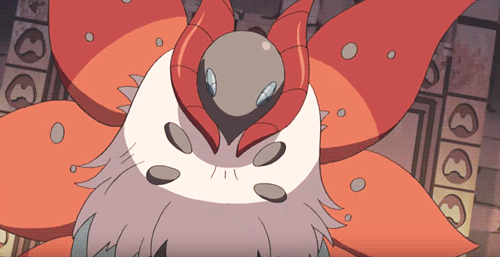
Volcarona is a Bug/Fire type Pokemon who was thought to be some sort of Sun Deity.
This Pokemon is not legendary yet considered rare in some regions.
At least when it comes to Unova….
The scales that drop from this Pokemon when it flies carry warmth like fire.
As a result this Pokemon is usually favored by people in colder areas.
You may have met your Volcarona in Relic Castle.
This place is a set of ruins deep in the Desert Resort of Unova, the region this Pokemon was introduced in.
You probably took your team in for some exploring and training.
That or you heard the rumors that there was an elusive Pokemon here.
When you eventually explore the ruins to the bottom floor you're greeted by a shrine.
On the walls is old art and depictions of a fire moth Pokemon thought to be like the sun.
Volcarona was worshiped by ancient civilizations due to its association with the sun.
The art on the walls is your first hint that you stumbled upon a sacred area.
Your next hint is hearing the cry of a Pokemon, only to turn and see a fully mature Volcarona.
This Pokemon is quite strong, as in the game this Pokemon is Level 70.
Battling it almost feels like a test.
Considering how this Pokemon used to be considered a holy symbol, it probably is.
But by the end of the battle it allows you to catch it.
After all, if you're so strong… it'll be worth listening to you.
Out of curiosity you find yourself interacting with the fire moth after you add it to your main team.
This begins your bond with it.
However… It also begins the start of a travesty.
At first, Volcarona listens to every command you give.
The Pokemon is receptive to your touch, it softly lets out a cry as you comb your fingers through the warm hair/fur on its body.
You don't expect it to do anything bad.
If anything it's just a cute sun moth with surprising power in battle.
For the most part it's docile before it's too attached.
Although the longer you train it, pet it, care for it… things start changing.
Your Volcarona expresses aggression during double or triple battles, not just towards enemies but your own team too.
The Pokemon never wants to go in its ball either.
Volcarona always wants to stay out of the ball, sticking close enough to you that you can feel the heat radiating off it.
The moth gets continuously clingy the longer it's with you.
Normally you could find a way to resolve the issue.
However things quickly take a turn for the worst.
Volcarona starts expressing agitation towards other trainers, even friends and family.
The Pokemon even seems to be oddly possessive of you.
Ironically because they're both fire types, this may end similarly to the Houndoom concept I made.
Something sets off the Pokemon and they leave in the middle of the night.
By the time you awake there's the smell of flames and burning wood.
When you open your eyes there's houses on fire.
You begin to panic but freeze when you see your Volcarona tilting its head, gently flying in front of you.
You're not stupid, you know it caused this.
Yet before you can try and flee, Volcarona uses a non-lethal move to tucker you out again.
Then the moth abandons your other Pokemon, dragging its trainer away.
Where is it going? Back home, of course.
When you awake you feel sand on your skin.
You're back where it all began, except this time you're much weaker.
You're at the shrine with Volcarona hovering over you.
Upon seeing you awake it lets out an excited cry before cuddling into you.
The warmth is soothing… yet you know what happened.
The sight of a flaming sea… the smell of burning wood and flesh… Volcarona in it all…
You no longer trust the moth.
But you can't escape it.
You have no other Pokemon… plus, Volcarona has other plans.
It doesn't plan on letting you leave.
Even if it means it'll have to use a move like Giga Drain on its dear trainer again.
144 notes
·
View notes